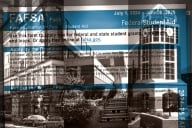You have /5 articles left.
Sign up for a free account or log in.

Getty Images
The real divide over higher ed may be driven by who shoulders the cost of -- and who benefits from -- education after high school, according to survey results released Tuesday by New America.
Recent surveys have suggested Republicans increasingly doubt the positive effects of higher ed. But the think tank's third annual survey of Americans' views of higher education, like previous editions, adds some nuance to narratives about an intractable partisan divide over the role of colleges.
Republicans, the survey finds, see postsecondary education as valuable for building careers and as a contributor to a strong workforce. Majorities of GOP respondents also agreed that public colleges are "for people like me" and said they're comfortable supporting those institutions with tax dollars.
The results show that Democrats and Republicans, liberals and conservatives, generally agree that some kind of education beyond high school is valuable, especially for individuals seeking a better paying job.
But they split sharply on who should pay for higher ed: Eighty percent of Democrats said the government should, because education is good for society. The majority of Republicans, 59 percent, said individuals should fund higher education because they personally benefit, while 37 percent said the federal government should pay for the costs of college.
(In the previous year's survey, 76 percent of Democrats and 34 percent of Republicans said the government should pay for higher ed.)
"We see big gaps when the question comes to funding," said Sophie Nguyen, a program associate at New America's Higher Education Initiative and one of the co-authors of the report. "But we see a lot more alignment when it comes to the value of higher education."
The question of who should pay for college, as much as the value added by postsecondary institutions, has played an increasing role in national politics in recent years as progressive politicians have pushed for free college. More recently, Democratic presidential candidates Bernie Sanders and Elizabeth Warren have called for cancelling student debt.
Just as notable as the partisan differences confirmed by the findings is the way attitudes toward higher ed are shaped by the race and age of respondents. The New America survey found black and Latinx respondents (67 percent) were more likely to support increased federal funding of higher education. Less than half of white respondents agreed.
Black respondents also offered the highest levels of support for free college. More than three-quarters of black respondents said they would be more likely to support a presidential candidate in the 2020 election who favored free college tuition; 47 percent said they strongly agreed. Forty-eight percent of white respondents said they would be more likely to support a candidate who took that position.
Wil Del Pilar, vice president of higher education policy and practice at Education Trust, said colleges in the U.S. have traditionally done a better job serving white students than students of color.
"These populations have much greater uncertainty as far as how they're going to pay for postsecondary education because of the racial wealth gap," he said. "It makes sense that they would favor more investment in higher education and policies like free college."
The survey findings also show clear generational divides over who should be responsible for funding higher education. The vast majority (80 percent) of Generation Z, the cohort born starting roughly in the mid-1990s, agreed the federal government should pay for higher ed. But support for public funding of postsecondary degrees was weaker among older generations. Generation Z was also least likely to agree that there are well-paying jobs available to people with only a high school degree.
To some extent, the racial and demographic splits on higher ed reflect the voting coalitions of Democrats, whose typical supporters are younger and more often voters of color, and Republicans. Douglas Harris, a senior fellow at the Brookings Institution's Brown Center on Education Policy, said those who tend to vote Democratic are more likely to be affected personally by increased debt levels. Democrats are also generally more supportive of government spending of all sorts, especially at the federal level, he said.
But Harris also noted that GOP politicians have talked about colleges in increasingly negative terms. Political polarization on higher education is driven by more overall political polarization combined with higher ed's new prominence in national political races.
"Some of this becomes a self-reinforcing cycle," he said. "I think that's part of what's driving this partisanship. It's going to affect your views when you see a barrage of negative messages. Likewise, when your preferred candidates talk about it positively, that's going to change your views."








